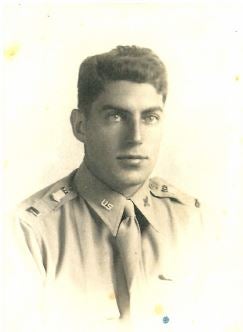- Major
- WW II
Biography
Major Kenneth M. Perkins was a native of Cranston, Rhode Island and a 1936 graduate of James T. Lockwood High School in Warwick, RI. He was an all-state pole vaulter and the goalie on the ice hockey team. Ken entered Rhode Island State College in the fall of 1936 and enrolled in the Army two-year ROTC program. He was a standout track star and co-captain of the Track team in his senior year. He was the New England Intercollegiate pole vaulting champion in 1940, clearing 13 feet 6 inches. He was a member of the Rhode Island Letterman Club and the Theta Chi Fraternity. In 1940, he graduated from URI with a Bachelor of Science Degree in Physical Education.
After graduation, Ken enlisted in the US Army Air Corps. He completed his initial pilot training at Augusta, Georgia and his advanced pilot training at Napier Field, Dothan, Alabama. Upon graduation from the US Army Air Cadet Program, Ken earned his wings as a US Army aviator and was commissioned as a Second Lieutenant in the Army Air Corps.
Lieutenant Perkins served in the European Theater during World War II as a “Member of the Greatest Generation.” As a P-47 Thunderbolt fighter pilot with the 19th Tactical Air Command, he flew over 20 sorties against the enemy as a member of the famed “Pioneer” fighter bomber group of the Ninth Army Air force. Lieutenant Perkins’ unit provided air cover, dive-bombed and strafed enemy troops, railroads and installations in support of General Patton’s Third Army march to and the crossing of the Rhine and the destruction of the German Army.
On 28 March 1945, as Lieutenant Perkins flew a P-51 Mustang fighter bomber to provide air support for Patton’s Third Army bridgeheads across the Rhine, he sighted a German air formation at 24,000 feet carrying bombs. Lieutenant Perkins’ squadron climbed to meet the enemy planes, forcing them to jettison their bombs.
A German ME-109 fighter made a fatal error when he flew between Lieutenant Perkins and his squadron commander. The German pilot did not see Lieutenant Perkins until he was within shooting range of the German plane. The enemy pilot tried to out- maneuver Lieutenant Perkins; and failing to achieve that, the enemy pilot dove for the deck at more than 500 miles per hour. When the German pilot pulled up, Lieutenant Perkins was right behind him and shot him down. As a result of Lieutenant Perkins’ actions, he was awarded the Air Medal with Oak Leaf Cluster.
Lieutenant Perkins also received a Certificate of Appreciation from General Hap Arnold, Commanding General, US Army Air Force, which stated in part: “Together we built the striking force that swept the Luftwaffe from the skies and broke the German power to resist. The contributions you made to the US Army Air Force was essential in making us the greatest team in the world.”
Lieutenant Perkins was designated a senior pilot from 1940 to 1945. He completed 77 combat missions and 237 combat hours in fighter aircraft. He was awarded the Air Medal with Eight Oak Leaf Clusters for his war time service in Africa, the Middle East and Europe. Lieutenant Perkins returned to civilian life after World War II and continued serving his country in the Rhode Island Air National Guard. Promoted to Major, he flew F-80’s and F-84’s and was selected as Squadron Commander of the Rhode Island Air National Guard, 152d Fighter Squadron until he retired as a Major in 1970. He also was the State of Rhode Island Military Pistol Champion for many years.
Major Perkins mentored many young men within the Rhode Island Air National Guard and military service to include his son, Lieutenant Gary Perkins (URI graduate) and his grandson Captain Scott Perkins. Ken continued to support the University of Rhode Island as an avid fan and financial supporter, especially his love for Track and Field.
As a citizen soldier, Ken Perkins answered the call as a member of “The Greatest Generation” that brought freedom to the world. He spent his entire life serving his community and nation during peace and war. His exemplary devotion to duty, personal bravery and outstanding leadership is in the highest traditions of the military service and reflect great credit upon himself, his family and the University of Rhode Island.
Major Kenneth M, Perkins died on 12 February 1984. While walking his dog, the dog fell through the ice; and Ken drowned trying to save his dog. He was buried with full military honors in All Saints Cemetery in Warwick, Rhode Island.
Education
1940

